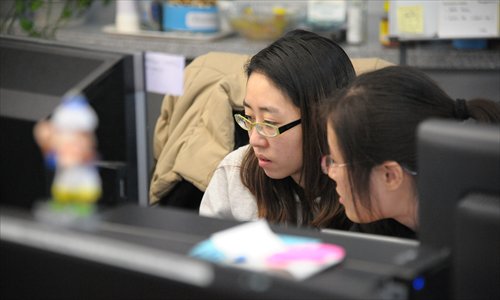Ladies who code
More Chinese women are being encouraged to lean into technology

Rails Girls Beijing provides a platform for girls to learn about computer coding. Photo: Courtesy of Wen Yang
Chen Ningjing is accustomed to being a "minority." She was among the few female students majoring in computer science at university, and one of only two female postgraduates acquiring a master's degree in that field. Now, she is the lone female software developer at an IT company in Stockholm, Sweden.
"It is common that men greatly outnumber women in computing jobs all over the world. But I do think women have their advantages over men in some coding positions," said 31-year-old Chen, who comes from Zhejiang Province.
Gender diversity in the workplace has been balancing out in recent years, but it remains largely unchanged in the IT industry. In the US, women hold almost half of the jobs in the country but they are still yet to pass the 25 percent mark in science, technology, engineering and mathematics jobs, according to a report published by the US Department of Commerce, Economics, and Statistics Administration.
In China, the ratio is even smaller with just 20 percent of computer programming jobs being held by women in 2014.
What is the problem? Although more post-1980s generation women are interested in programming, engineering, and other technology-based jobs, the pressure to quit is great, and the few that make it through still face challenges at work.
Overcoming gender-based stereotypes
The gender gap in IT may have its roots in schools where stereotypes suggesting that men are more logical and better in math and science prevail.
"I was an exceptional student, especially in math," said Chen. "But when I ascended to higher grades, I was warned by despising voices that girls couldn't continue to do well in math and science as they grew older."
In the US, women in computing jobs dropped from 35 percent in 1990 to 26 percent in 2013. China, again, faces a more dire situation. In 1981, girls accounted for about 20 percent of the students majoring in computer science at Tsinghua University. While in 2013, the ratio declined to less than 10 percent, the China Youth Daily reported last year.
Sa Boya, 23, a postgraduate student majoring in computer science at Peking University, said she used to suffer from frustration and self-doubt, under pressures from studying and the gender gap.
"Sometimes girls, in general, spend more time than boys in solving a programming problem, which can be discouraging," said Sa, who is also a co-founder of "Girls who code," a WeChat account that allows Chinese female software engineers to share their stories.
"My frustration would become compounded when the teachers select boys, whose academic study are no better than mine, for their team, only because boys are considered better problem solvers," she said.
Another obstacle that often holds women back from seeking more meaningful and highly rewarding computing careers is their perceived aversion to risk. Jobs in the technology sector are viewed as normal for men, but risky for women and, as a result, some parents pressure their daughters to switch careers.
"Parents often persuade their daughters to opt for more stable jobs such as a clerical worker or a public servant because computing jobs are too demanding," said Chen.
In the workplace, the gender gap leads to a startling lack of female role models.
"Women can feel isolated and unsure about their promotion path," said Wen Yang, organizer of Rails Girls China, an offshoot of the Finland-based global non-profit volunteer community Rails Girls, whose aim is to equip women with the necessary tools to understand and utilize technology to develop their ideas.
"The business circles of software developers are also dominated by men, and the main stream thinks men are more capable than women in science, technology, engineering and mathematics. Also, some IT companies refuse to recruit women in China, which makes it hard for them to get involved and results in a lack of emotional support for women in technology," said Wen.

Women who can code will have more opportunities in the IT industry and shape the world via technology. Photo: Courtesy of Wen Yang
Empowering women through tech
In the US, NGO programs such as Girls Who Code and Girlstart, are supported by IT companies and universities in an effort to help young women grow and succeed in technology.
In China, Wen, who works for a State-owned company, and has been volunteering with Rails Girls for three years, organizes nationwide events that provide a one-day workshop to teach girls how to code using Ruby on Rails, a web application development framework.
An annual event, the 6th Rails Girls Beijing, a spin-off of Rails Girls China, was held in September, and 120 girls and 40 coaches attended, bringing the total number of participants since its first staging to 350 persons.
While not devaluing their progress thus far, Chen said there is still plenty of room for improvement.
"Rails Girls China is a non-profit organization. We need more professional women to volunteer and help Rails Girls China become stronger. With more volunteers, a greater number of Chinese girls will get access to learning how to code."
Frenchman Le Henaff Loic, 28, who works for the Beijing office of ThoughtWorks, a software design and consulting company that advocates for social change through technology, was one of the coaches. During the workshop, women worked in groups of three or four and were guided by a coach as they learned how to build a Web application.
"There is a huge misconception that IT is mainly for guys, which is obviously wrong. Rails Girls tries to change this idea by enabling women to code. The point of the workshop is to let people do and build something," Le Henaff said.
By building your own application, coaches delivered the concept that software development is not rocket science but something anyone can do if they choose to.
"If you have a logical mind, and, more than everything else, are motivated and curious, then you can go," said Le Henaff.
One of the new faces on the female tech scene is Karlie Kloss, a former Victoria's Secret supermodel who started learning to code. With the Flatiron School, a New York-based school trains people in Web and mobile development, she jointly launched "Kode with Karlie," a scholarship project that financially supports 20 American girls to attend a two-week coding camp.
Chen Yuwang, 22, is one of the Chinese girls who turned to study coding after she got her first job at Google. A math major, she made the decision to become a software developer because she wants to "help others feel better" through technology. "I knew it would be a new field. But I thought, 'I am still young; there are lots of possibilities in life.' I didn't see the challenge as a risk, rather, it was exciting," she said.
Then there were the late nights learning from documents, coding, practicing, and her depressed feelings about her role in the team. But it didn't take long for her to get accustomed to her new role, realizing that each one has their expertise.
She was also lucky that Google has a company culture that supports women in the technology field. For example, WTM (Women Techmaker) is one of the activities supported by Google to help more women, both inside and outside of the company, move forward in IT field.
Female perspective needed
The digital-driven economy has provided the society with a growing number of computing job opportunities; and a lot of IT companies, in fact, would rather hire ladies, but there is an insufficient supply of applicants, said Chen Ningjing.
For example, Le Henaff said his company tries to balance gender by making an extra effort to hire women. The Chief Technology Officer of ThoughtWorks is a woman.
A recent report, "How Advancing Women's Equality Could Add $2.5 Trillion to China's Growth in 2025" by McKinsey Global Institute, indicates that "women play an identical role in the labor market as men…but women in China face relatively high inequality in the workplace, primarily driven by the gender gap in leadership and unpaid work."
The report suggests that "action [to change] could be focused on the booming Internet economy where shops owned by women are estimated to account for 46 percent of total online transactions."
"It means that women will have more opportunities in the labor market," said Chen Ningjing.
Chen Ningjing's husband is a back-end programmer. She said while her husband is better at building databases she is better in Web design.
"When I do my job, a lot of my male colleagues would say, 'Yes, this is exactly what we need!' Women are more sensitive than men, and sometimes are too emotional, but the female mindset will make the face of technology better," she said.
"I don't want that in the future, robots are operating only according to the mindset of men. They should have women's ideas, too."